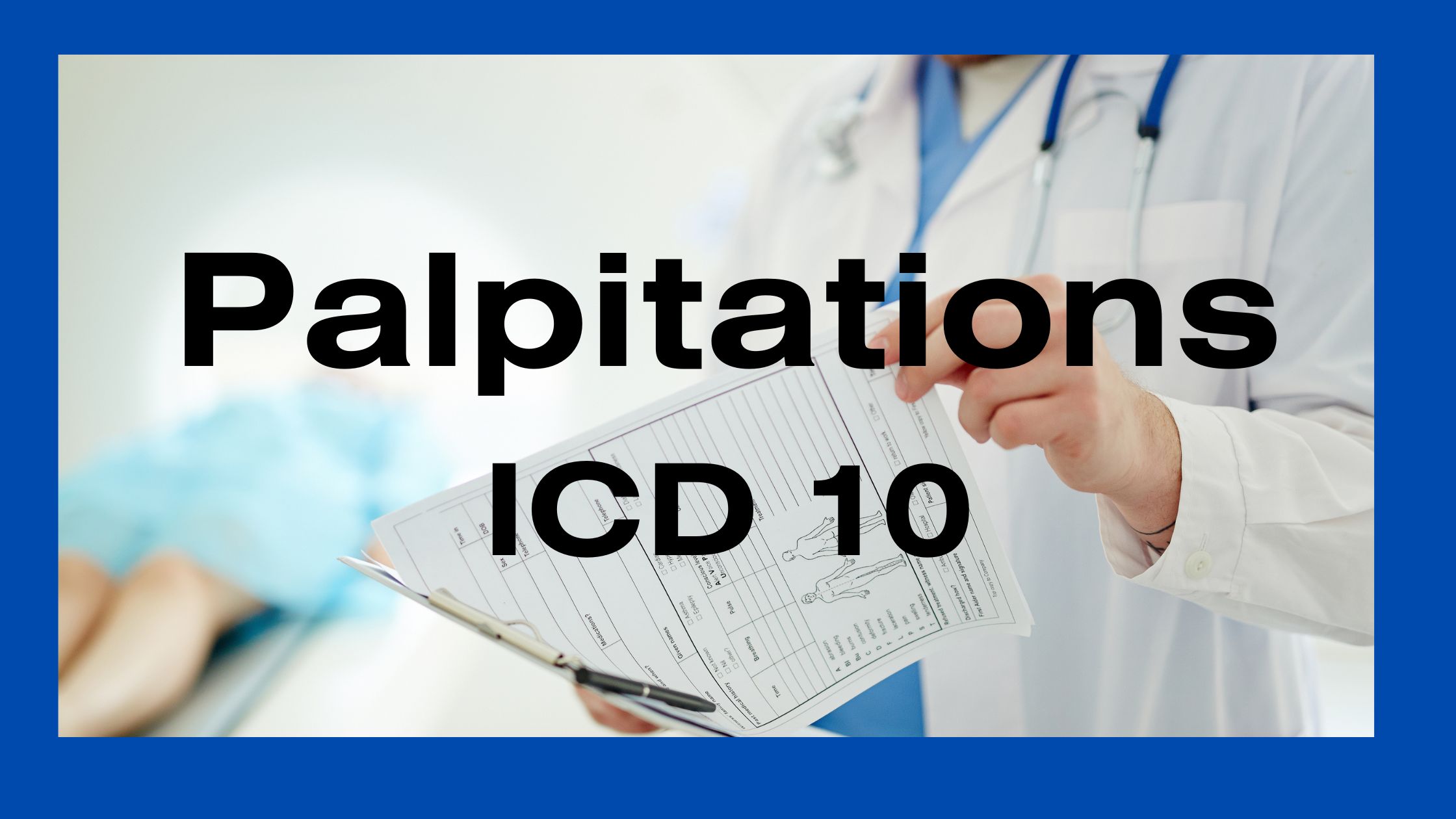Palpitations can be a concerning and uncomfortable sensation, causing individuals to experience an irregular or rapid heartbeat. These palpitations can occur suddenly, leading to distress and anxiety for many people. Healthcare professionals rely on the International Classification of Diseases (ICD) coding system to effectively diagnose and treat palpitations ICD10. In this article, we will delve into the details of beatings, focusing on Palpitations ICD10 code R00.2, to comprehensively understand this condition.
List of Related Palpitations ICD 10 Codes
R00 Abnormalities of heart beat
- R00.0 Tachycardia, unspecified: This code is used when a patient is experiencing a rapid heart rate, but the specific type or cause is not known. Tachycardia is generally defined as a resting heart rate over 100 beats per minute.
- R00.1 Bradycardia, unspecified: This code is used when a patient has a slow heart rate, but the specific type or cause is not known. Bradycardia is generally defined as a resting heart rate under 60 beats per minute.
- R00.2 Palpitations: This code is used when a patient experiences an abnormal awareness of their own heartbeat. Palpitations can feel like rapid, strong, or irregular heartbeats and may be related to various underlying causes.
- R00.8 Other abnormalities of heart beat: This code is used for abnormalities of heart rhythm or rate that do not fit into the categories above. It encompasses other specific cardiac rhythm issues.
- R00.9 Unspecified abnormalities of heart beat: This code is used when there is an abnormality of the heart rate or rhythm, but it cannot be further specified or diagnosed at the time of assessment.
R01 Cardiac murmurs and other cardiac sounds
- R01.0 Benign and innocent cardiac murmurs: This code is used for cases where a healthcare provider detects a heart murmur that is not associated with any underlying heart disease or abnormality. Benign murmurs are typically harmless.
- R01.1 Cardiac murmur, unspecified: This code is used when a cardiac murmur is heard but not further characterized or diagnosed. Additional tests may be needed to determine the cause and significance.
- R01.2 Other cardiac sounds: This code is used when abnormal sounds are detected during a cardiac examination other than murmurs. These sounds may include clicks, snaps, or other unusual noises.
R03 Abnormal blood-pressure reading, without diagnosis
- R03.0 Elevated blood-pressure reading, without diagnosis of hypertension: This code is used when a patient has a high blood pressure reading during an assessment, but it does not meet the criteria for a formal diagnosis of hypertension. Further monitoring may be required.
- R03.1 Nonspecific low blood-pressure reading: This code is used when a patient has a low blood pressure reading during an assessment, but the cause is not clearly identified. Low blood pressure can have various causes and may require further evaluation.
R04 Hemorrhage from respiratory passages: This code is used when there is bleeding or hemorrhage from the respiratory passages, such as the nose, throat, or lungs. This can be due to various causes, including infections, trauma, or underlying medical conditions.
Understanding Palpitations
Palpitations refer to the awareness of one’s heartbeat. While it is normal to feel the heart’s beats occasionally, palpitations occur when an individual becomes excessively aware of their heart’s rhythm, leading to a sensation of irregular or rapid beating. These sensations can vary in intensity, duration, and frequency, ranging from mild and sporadic to severe and persistent.
Palpitations can be a distressing experience, often accompanied by feelings of anxiety and worry. It is important to understand that palpitations are not a disease but a symptom of an underlying cause. By paying attention to the frequency and duration of pulses, individuals can provide valuable information to healthcare professionals for accurate diagnosis and treatment.
Causes of Palpitations
Palpitations can be attributed to various factors, both physiological and psychological. Identifying and addressing these underlying causes is important to manage and treat palpitations effectively. Some common causes include:
1. Stress and Anxiety: High stress and anxiety levels can trigger palpitations by increasing the release of stress hormones, leading to a faster heart rate. Individuals who experience chronic stress or suffer from anxiety disorders may be more prone to vibrations.
2. Medications and Substances: Certain medications, such as those used to treat asthma or thyroid conditions, can cause palpitations as a side effect. Excessive amounts of caffeine, nicotine, or alcohol can contribute to palpitations. It is important to discuss any medications or substances being used with a healthcare professional to identify possible triggers.
3. Physical Exertion: Engaging in intense physical activity or overexertion can result in palpitations due to increased oxygen and blood flow demand. This is often temporary and resolves once the body returns to rest. However, individuals with pre-existing heart conditions may be more susceptible to palpitations during physical exertion and should consult a healthcare professional for guidance.
4. Hormonal Changes: Hormonal fluctuations during menstruation, pregnancy, or menopause can influence heart rhythm and potentially lead to palpitations. These changes are in hormonal levels and can affect the electrical signals that regulate the heart’s rhythm. It is important for individuals experiencing palpitations during these periods to discuss their symptoms with a healthcare professional.
5. Underlying Medical Conditions: Palpitations symptom of an underlying medical condition, such as anemia, hyperthyroidism, heart disease, or arrhythmias. Identifying and addressing these conditions is crucial to managing and treating palpitations effectively. Healthcare professionals may perform additional tests and evaluations to determine the underlying cause.
Diagnosing Palpitations with ICD 10, R00.2
ICD 10 is a standardized coding system healthcare professionals use to classify and code diseases, symptoms, and medical procedures. The specific ICD 10 code for palpitations is R00.2. When a patient presents with palpitations, healthcare professionals can use this code to document and track the condition accurately.
ICD 10 code R00.2 falls under Chapter 18: Symptoms, signs, and abnormal clinical laboratory findings, not elsewhere classified, in the ICD 10 coding system. This code is used specifically for palpitations, providing a clear and consistent way of documenting this symptom across healthcare settings globally.
By utilizing the ICD 10 code R00.2, healthcare professionals can effectively communicate and share information about the diagnosis, treatment, and management of palpitations. This standardized coding system ensures accurate record-keeping and enables healthcare providers to track the prevalence and trends of palpitations in different populations.
Treatment Options for Palpitations
The treatment for palpitations depends on the underlying cause identified through a comprehensive evaluation. It is important to find the root cause to effectively manage and reduce the frequency of vibrations. Here are some common treatment options:
1. Lifestyle Modifications: Adopting a healthy lifestyle can help manage palpitations. This includes reducing stress levels through stress-reduction techniques such as meditation, deep breathing exercises, or engaging in activities that promote relaxation. Avoiding triggers such as excessive caffeine intake, smoking, or consuming alcohol is also important. Maintaining a balanced diet, regular exercise, and ensuring sufficient sleep benefit overall heart health.
2. Medications: Sometimes, healthcare professionals may prescribe medications to regulate heart rhythm, reduce anxiety, or treat any underlying medical condition contributing to palpitations. Medications such as beta-blockers, antiarrhythmics, or anti-anxiety drugs may be prescribed based on the individual’s specific needs and medical history. Following the prescribed dosage and consult a healthcare professional for any concerns or side effects is important.
3. Cardiac Procedures: In severe cases, cardiac procedures may be necessary to address the underlying cause of palpitations. These can include catheter ablation, a minimally invasive procedure to correct abnormal heart rhythms, implantation of a pacemaker to regulate heart rate or other surgical interventions. These procedures are typically recommended when other treatment options have been unsuccessful or when there is a significant risk to the individual’s overall health.
Prevention and Self-Care
Preventing palpitations involves adopting healthy habits and making certain lifestyle modifications. By incorporating the following self-care measures into daily routines, individuals can potentially reduce the frequency and intensity of palpitations:
1. Stress Management: Implement stress-reduction techniques such as meditation, deep breathing exercises, or engaging in activities that promote relaxation. By managing stress levels, individuals can reduce the release of stress hormones contributing to palpitations.
2. Avoid Triggers: Identify and avoid substances or activities that trigger palpitations, such as excessive caffeine intake, smoking, or consuming alcohol. It may be helpful to record any triggers and symptoms experienced to identify patterns and make necessary adjustments.
3. Regular Exercise: Engage in regular physical activity to improve overall cardiovascular health and reduce the risk of palpitations.
4. Balanced Diet: Maintain a nutritious and balanced diet, ensuring an adequate intake of vitamins, minerals, and electrolytes to support heart health. Including foods rich in potassium, magnesium, and omega-3 fatty acids can be beneficial. It is recommended to limit the intake of processed foods, added sugars, and unhealthy fats.
Conclusion
Palpitations, characterized by an irregular or rapid heartbeat, can be distressing for individuals experiencing them. By utilizing the ICD 10 code R00.2, healthcare professionals can accurately diagnose and document palpitations for effective tracking and treatment. Identifying and addressing the underlying causes of palpitations, ranging from stress and anxiety to underlying medical conditions, is important. With appropriate lifestyle modifications, medications, and, in severe cases, cardiac procedures, individuals can manage palpitations and improve their overall heart health. Consult with a healthcare professional for a proper diagnosis and treatment plan tailored to your needs. Individuals can effectively manage palpitations and maintain a healthy heart by taking proactive steps and working closely with healthcare professionals.
FAQ
Ans. Palpitations are the awareness of one’s heartbeat, characterized by a sensation of irregular or rapid beating.
Ans. Common causes of palpitations include stress and anxiety, medications and substances, physical exertion, hormonal changes, and underlying medical conditions.
Ans. The ICD 10 code for palpitations is R00.2.
Ans. Treatment options for palpitations include lifestyle modifications, medications, and cardiac procedures, depending on the underlying cause identified through evaluation.

